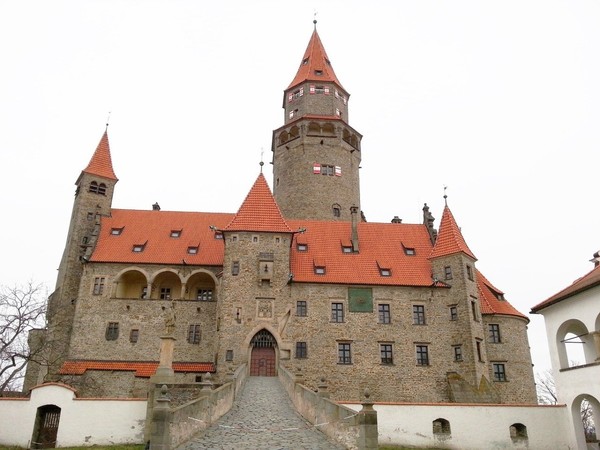The state-owned castles of Bouzov and Český Krumlov will become the scene of unique research into the influence of disinfectants on the surface of historical objects, such as antique railings, handrails, metal handles, and lacquered parquet floors. The two-year research project is organised by experts from the Department of Analytical Chemistry, Faculty of Science, Palacký University Olomouc, together with a team from the National Heritage Institute and the Academy of Fine Arts in Prague.
So far, castellans lack clear information on how to proceed with the disinfection of antique surfaces, which is now being carried out in connection with the pandemic of the new coronavirus. “They fear that, when used for a long time, the disinfectants might damage, for example, antique door handles or the railings of the castle staircase. Therefore, we will try to find a gentle and at the same time effective procedure for disinfecting the surfaces of historical objects,” said Karel Lemr from the Department of Analytical Chemistry.
Research will help to find answers to questions about the use of disinfectants in the treatment of antique surfaces. “The need for such targeted research arose from the extraordinary situation in the spring of this year, when the National Heritage Institute had to flexibly deal with the new hygienic requirements for operations as part of the start of the visiting season. Our main motivation and at the same time obligation is to ensure safe visitor operations at castles and chateaux and simultaneously to maximally protect the managed property during increased anti-epidemic measures,” added Jana Michalčáková from the National Heritage Institute.
Experts have already mapped out how surface disinfection is carried out at the castles of Bouzov, Český Krumlov and other buildings managed by the National Heritage Institute. “The range of these disinfectants is relatively wide. The most gentle treatment is with soapy water,” said Lemr.
Subsequently, the researchers will test the effect of these disinfectants on specific surfaces and surface treatments in laboratories. “The first testing will obviously be on model samples prepared by colleagues from the Academy of Fine Arts,” said Karel Lemr. Using special methods, experts will record surface changes after disinfectant application. “The range of methods is wide. For example, the colour and reflectivity of the surface are measured. The samples will also be examined by microscopic techniques to find out whether the disinfectant disrupts the surface structure,” he said, describing the upcoming research.
The final part of the project will take place directly at the monuments in Český Krumlov and Bouzov, which have a wide range of different types of visitor spaces. According to Lemr, disinfectants might not directly cause a chemical change to the object to which it is applied. However, they could damage the protective surface layer, which could subsequently cause e.g. corrosion of the historical object. “We will monitor how the test sample will change over time after applying disinfectants to it at regular intervals,” he added.
If scientists notice any changes on the surface, they will begin to investigate which component of the disinfectant caused them. “Subsequently, we will assess whether we can exclude this risk component from the disinfectant or replace it,” said Karel Lemr.
The scientists’ findings will be the basis for the creation of a recommendation by the National Heritage Institute on the most suitable disinfectants for use on historical surfaces, or on how to properly treat the object after disinfection to prevent undesirable changes. The National Heritage Institute has not yet recorded any damage caused by the long-term use of disinfectants. Funding for this research was obtained from the Technology Agency of the Czech Republic.
